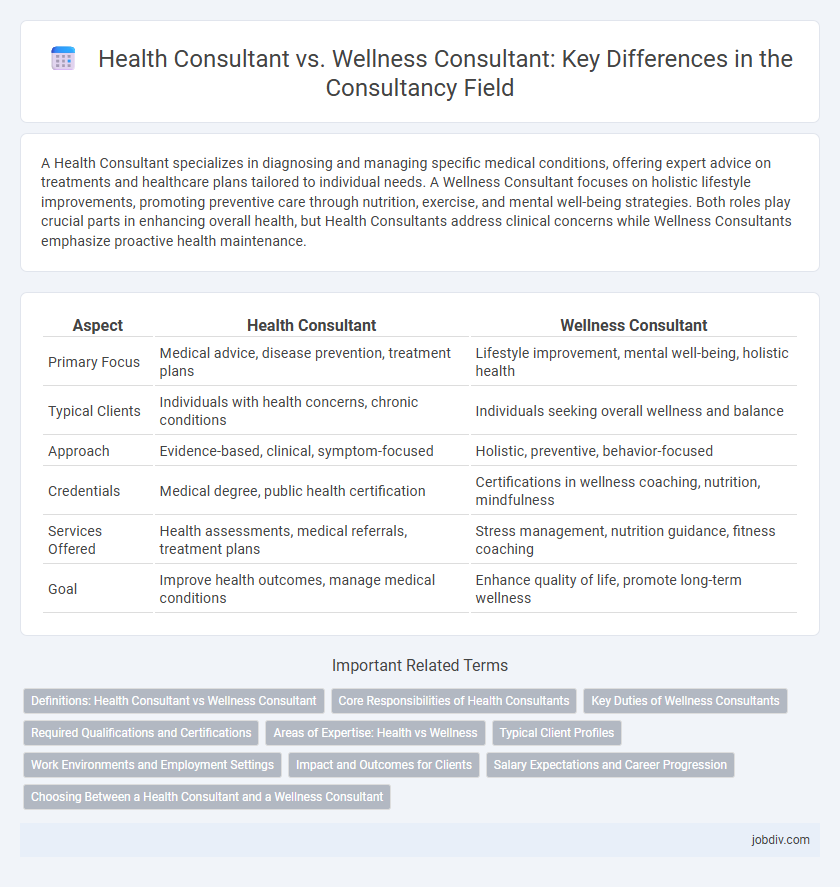A Health Consultant specializes in diagnosing and managing specific medical conditions, offering expert advice on treatments and healthcare plans tailored to individual needs. A Wellness Consultant focuses on holistic lifestyle improvements, promoting preventive care through nutrition, exercise, and mental well-being strategies. Both roles play crucial parts in enhancing overall health, but Health Consultants address clinical concerns while Wellness Consultants emphasize proactive health maintenance.
Table of Comparison
| Aspect | Health Consultant | Wellness Consultant |
|---|---|---|
| Primary Focus | Medical advice, disease prevention, treatment plans | Lifestyle improvement, mental well-being, holistic health |
| Typical Clients | Individuals with health concerns, chronic conditions | Individuals seeking overall wellness and balance |
| Approach | Evidence-based, clinical, symptom-focused | Holistic, preventive, behavior-focused |
| Credentials | Medical degree, public health certification | Certifications in wellness coaching, nutrition, mindfulness |
| Services Offered | Health assessments, medical referrals, treatment plans | Stress management, nutrition guidance, fitness coaching |
| Goal | Improve health outcomes, manage medical conditions | Enhance quality of life, promote long-term wellness |
Definitions: Health Consultant vs Wellness Consultant
A Health Consultant specializes in providing expert advice on managing medical conditions, disease prevention, and healthcare strategies tailored to individuals or organizations. A Wellness Consultant focuses on holistic approaches to improve overall well-being through lifestyle changes, nutrition, fitness, and stress management. Both roles aim to enhance quality of life, but Health Consultants emphasize clinical health metrics while Wellness Consultants prioritize preventive wellness practices.
Core Responsibilities of Health Consultants
Health consultants primarily assess individual or organizational health risks, develop personalized health plans, and ensure compliance with medical regulations. They analyze medical histories and lifestyle factors to recommend evidence-based interventions aimed at improving physical health outcomes. Their core responsibilities also include coordinating with healthcare providers and monitoring patient progress to optimize treatment efficacy.
Key Duties of Wellness Consultants
Wellness consultants primarily focus on promoting holistic health by designing personalized lifestyle plans that include nutrition, exercise, and stress management strategies. They assess clients' physical and mental well-being to recommend preventive measures and wellness programs tailored to individual needs. Unlike health consultants who often prioritize medical and clinical guidance, wellness consultants emphasize sustainable habits and overall life balance for long-term health improvement.
Required Qualifications and Certifications
Health consultants typically require certifications such as Certified Health Education Specialist (CHES) or Registered Health Consultant (RHC), emphasizing expertise in medical knowledge, disease prevention, and healthcare systems. Wellness consultants often pursue certifications like Certified Wellness Practitioner (CWP) or National Board Certified Health & Wellness Coach (NBC-HWC), focusing on lifestyle management, nutrition, and holistic health strategies. Both roles demand a strong educational background in health sciences, with specialized training tailored to their distinct advisory objectives.
Areas of Expertise: Health vs Wellness
A Health Consultant specializes in medical and clinical knowledge, focusing on disease prevention, diagnosis, and treatment plans, often working closely with healthcare providers and patients for managing chronic conditions. In contrast, a Wellness Consultant emphasizes holistic approaches to lifestyle, nutrition, fitness, and mental well-being, aiming to enhance overall quality of life through personalized wellness programs. Both roles analyze health data but differ significantly in scope; Health Consultants prioritize clinical outcomes, while Wellness Consultants target proactive health maintenance and balanced living.
Typical Client Profiles
Health consultants typically work with clients managing chronic illnesses, seeking medical advice, or requiring rehabilitation plans, including hospitals, clinics, and individual patients with specific health conditions. Wellness consultants focus on individuals or organizations aiming to improve overall well-being, stress management, and lifestyle changes, often engaging corporate employees, fitness enthusiasts, or community wellness programs. Both consultants tailor their services to meet the distinct needs of their client profiles, emphasizing either medical health outcomes or holistic wellness improvements.
Work Environments and Employment Settings
Health consultants primarily work in clinical environments, hospitals, and healthcare organizations, focusing on improving patient care and regulatory compliance. Wellness consultants are often employed in corporate offices, fitness centers, and community programs, emphasizing preventive health and lifestyle optimization. Both roles demand collaboration with multidisciplinary teams but differ in setting and primary objectives.
Impact and Outcomes for Clients
Health consultants primarily focus on diagnosing health issues and developing medically-informed strategies to improve client well-being, directly impacting physical health outcomes such as disease management and prevention. Wellness consultants emphasize holistic lifestyle adjustments, including nutrition, stress management, and fitness, promoting overall balance and long-term vitality. Clients benefit from health consultants through targeted medical improvements, while wellness consultants deliver sustained enhancements in lifestyle quality and mental well-being.
Salary Expectations and Career Progression
Health consultants typically earn a median salary of $70,000 to $90,000 annually, with opportunities to advance into senior advisory or healthcare management roles, leveraging their expertise in clinical and regulatory environments. Wellness consultants often command salaries ranging from $50,000 to $75,000, focusing on lifestyle and holistic health strategies, with career progression into corporate wellness program management or specialized coaching sectors. Both paths offer growth potential, but health consultants generally experience higher salary ceilings due to their specialized healthcare knowledge and regulatory responsibilities.
Choosing Between a Health Consultant and a Wellness Consultant
Choosing between a health consultant and a wellness consultant depends on the specific goals and needs of the individual or organization. Health consultants focus on medical conditions, disease management, and healthcare system navigation, while wellness consultants emphasize prevention, lifestyle improvements, and holistic well-being. Understanding whether the priority is clinical intervention or promoting long-term health habits ensures the right expertise is selected.
Health Consultant vs Wellness Consultant Infographic

 jobdiv.com
jobdiv.com